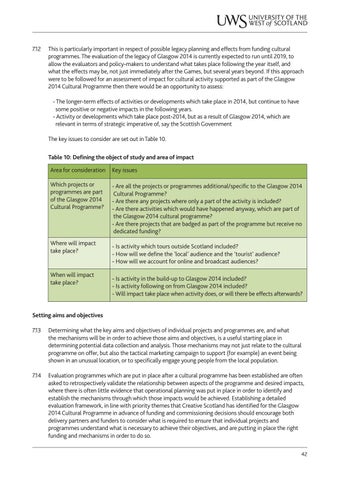7.12
This is particularly important in respect of possible legacy planning and effects from funding cultural programmes. The evaluation of the legacy of Glasgow 2014 is currently expected to run until 2019, to allow the evaluators and policy-makers to understand what takes place following the year itself, and what the effects may be, not just immediately after the Games, but several years beyond. If this approach were to be followed for an assessment of impact for cultural activity supported as part of the Glasgow 2014 Cultural Programme then there would be an opportunity to assess: - The longer-term effects of activities or developments which take place in 2014, but continue to have some positive or negative impacts in the following years. - Activity or developments which take place post-2014, but as a result of Glasgow 2014, which are relevant in terms of strategic imperative of, say the Scottish Government The key issues to consider are set out in Table 10. Table 10: Defining the object of study and area of impact Area for consideration
Key issues
Which projects or programmes are part of the Glasgow 2014 Cultural Programme?
- Are all the projects or programmes additional/specific to the Glasgow 2014 Cultural Programme? - Are there any projects where only a part of the activity is included? - Are there activities which would have happened anyway, which are part of the Glasgow 2014 cultural programme? - Are there projects that are badged as part of the programme but receive no dedicated funding?
Where will impact take place?
When will impact take place?
- Is activity which tours outside Scotland included? - How will we define the ‘local’ audience and the ‘tourist’ audience? - How will we account for online and broadcast audiences? - Is activity in the build-up to Glasgow 2014 included? - Is activity following on from Glasgow 2014 included? - Will impact take place when activity does, or will there be effects afterwards?
Setting aims and objectives 7.13
Determining what the key aims and objectives of individual projects and programmes are, and what the mechanisms will be in order to achieve those aims and objectives, is a useful starting place in determining potential data collection and analysis. Those mechanisms may not just relate to the cultural programme on offer, but also the tactical marketing campaign to support (for example) an event being shown in an unusual location, or to specifically engage young people from the local population.
7.14
Evaluation programmes which are put in place after a cultural programme has been established are often asked to retrospectively validate the relationship between aspects of the programme and desired impacts, where there is often little evidence that operational planning was put in place in order to identify and establish the mechanisms through which those impacts would be achieved. Establishing a detailed evaluation framework, in line with priority themes that Creative Scotland has identified for the Glasgow 2014 Cultural Programme in advance of funding and commissioning decisions should encourage both delivery partners and funders to consider what is required to ensure that individual projects and programmes understand what is necessary to achieve their objectives, and are putting in place the right funding and mechanisms in order to do so. 42












